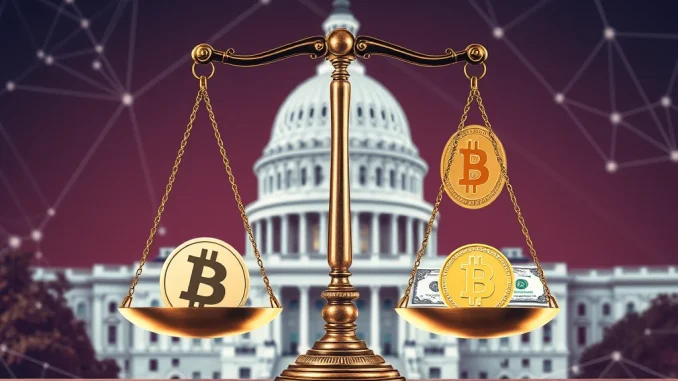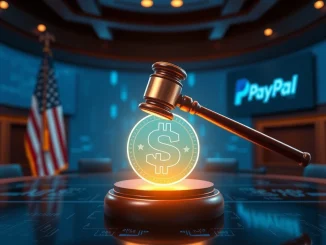
Big news is brewing on Capitol Hill that could significantly impact the world of digital assets, specifically **stablecoins**. The U.S. Senate is gearing up for a crucial vote on the GENIUS Act this week, a piece of legislation that many observers believe could fundamentally redefine how these tokens are viewed and used.
Understanding the GENIUS Act and Its Focus on Stablecoins
So, what exactly is the GENIUS Act, and why is it causing such a stir in the crypto community? At its core, the bill aims to establish a clear regulatory framework for **stablecoins** in the United States. For years, the regulatory status of stablecoins has been a subject of debate, creating uncertainty for issuers, users, and developers.
According to reports, including one from CoinDesk citing analysis by Bernstein, the GENIUS Act is expected to pass the Senate and potentially become law in the coming months. This would mark a significant step forward in formalizing **crypto regulation** at the federal level.
Regulating Stablecoins as Digital Cash
One of the most impactful provisions of the GENIUS Act is its proposed classification of **stablecoins** as a form of **digital cash**. This isn’t just a semantic change; it carries substantial implications for how stablecoins would be treated under U.S. law. Treating them as digital cash could:
- Provide regulatory clarity and certainty for issuers and users.
- Potentially integrate stablecoins more seamlessly into existing financial infrastructure.
- Lay the groundwork for broader acceptance and use in everyday transactions.
This regulatory clarity is seen by many as a necessary step for stablecoins to achieve their full potential as a reliable medium of exchange.
Boosting Mainstream Adoption Through Regulation
The expectation is that by providing a clear regulatory framework and classifying stablecoins as **digital cash**, the GENIUS Act could significantly push mainstream adoption. Current uncertainty has been a barrier for many traditional businesses and consumers hesitant to engage with digital assets. With clear rules in place, stablecoins could become a more attractive and viable option for payments, remittances, and other financial activities.
Increased regulatory certainty often leads to greater institutional interest and investment, which in turn can drive broader public awareness and adoption. The bill aims to create an environment where stablecoins can thrive within a regulated ecosystem.
Limiting Non-Financial Firms: What This Means for Companies Like Amazon and Walmart
An interesting aspect of the GENIUS Act is its approach to non-financial firms issuing their own stablecoins. The bill is expected to limit the ability of companies like Amazon, Walmart, or other large tech and retail giants from issuing their own proprietary tokens intended for widespread payment or exchange. Instead, these firms would likely be required to partner with regulated stablecoin issuers.
This provision seems designed to prevent potential monopolies or undue influence over the financial system by non-bank entities. It could also ensure that stablecoin issuance remains primarily within the purview of entities subject to financial regulations, potentially enhancing stability and consumer protection. This could shape the landscape of corporate involvement in the digital asset space, encouraging collaboration rather than independent token creation by non-financial entities.
The Path Ahead: The US Senate Vote and Beyond for Crypto Regulation
The upcoming vote in the **US Senate** is a critical moment for the GENIUS Act. If it passes, the bill will then move through the rest of the legislative process. While the path to becoming law involves further steps, the Senate vote is a major hurdle. The expectation that it could become law in the coming months suggests a growing bipartisan recognition of the need for **crypto regulation**, particularly concerning stablecoins.
The outcome of this legislative effort will be closely watched by the entire crypto industry, regulators globally, and traditional financial institutions. It represents a potential turning point in how the U.S. approaches digital currency and its integration into the broader economy.
Conclusion
The GENIUS Act, currently before the **US Senate**, holds the potential to be a landmark piece of legislation for the digital asset space. By aiming to regulate **stablecoins** as **digital cash**, it seeks to provide much-needed clarity, potentially accelerating mainstream adoption and shaping the future of **crypto regulation** in the United States. While the legislative process continues, the focus on creating a clear framework signals a maturing approach to digital currency by U.S. policymakers. The outcome of this vote and the bill’s journey will undoubtedly have lasting effects on the role stablecoins play in our financial future.



